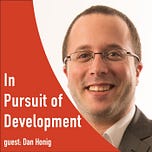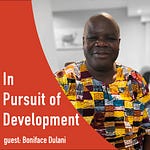In an excellent book on how aid agencies manage foreign aid projects, Dan Honig argues that tight top-down controls and a focus on target-setting and metrics often lead aid projects astray.
If one navigates from the top, one may achieve more management control, more oversight, and more standardized behavior. But this may be at the cost of flexibility and adaptability. By contrast, if one empowers those closest to the ground, and focuses on what field agents can see and learn, we may apply so-called “soft information” that will in turn allow for more flexibility.
Managing large organizations is not easy. And most politicians and bureaucrats struggle to find the right balance between when to control and when to let go. In the book Navigation by Judgment: Why and When Top-Down Control of Foreign Aid Doesn't Work, Dan Honig argues that a misplaced sense of what it means to “succeed” encourages many aid agencies to get the balance wrong.
Dan Honig is an assistant professor of international development at Johns Hopkins School of Advanced International Studies (SAIS). He is currently a visiting fellow at Leiden University’s Institute of Political Science, and a non-resident fellow at the Center for Global Development. He was previously special assistant, then advisor, to successive Ministers of Finance in Liberia and ran a local nonprofit in East Timor focused on helping post-conflict youth realize the power of their own ideas.
Dan is busy completing his next book on “Mission-Driven Bureaucrats”, which explores the relationship between motivation, management practice, organizational mission, and performance in the public service.
Actually Navigating byJudgment: Towards aNew Paradigm of DonorAccountability Where theCurrent System Doesn’t Work (policy paper, Centre for Global Development)
Managing Better: What All of Us Can Do to Encourage AidSuccess (CGD Brief, Center for Global Development)
"Making Good On Donors' Desire to Do Development Differently", Third World Quarterly 39:1, 68-84 (Honig & Gulrajani, 2018).
"Information, Power, & Location: World Bank Staff Decentralization and Aid Project Success”, Governance 33:4, 749-769. (2020)
The Limits of Accounting-Based Accountability in Education (and Far Beyond): Why More Accounting Will Rarely Solve Accountability Problems (Honig & Pritchett, working paper, Center for Global Development)
Dan Banik and In Pursuit of Development on Twitter













Share this post